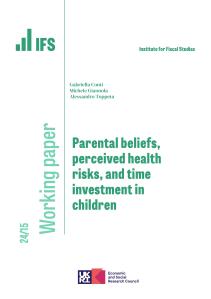<p>Previous research published by the Institute for Fiscal Studies (IFS) has shown that children born at the start of the academic year achieve better exam results, on average, than children born at the end of the academic year. In England, this means that children born in the autumn tend to outperform those born in the summer. New research published today by IFS, and funded by the Nuffield Foundation, shows that month of birth also matters for other characteristics and outcomes of young people growing up in England today. </p>
Authors

Lorraine Dearden

Research Fellow University College London
Claire is a Research Fellow at IFS, working on the determinants and consequences of participation in childcare and education for parents and children.

Research Fellow University of Bristol
Ellen, who was a Senior Research Economist at IFS and is now a Research Fellow, is a Max Weber Fellow at the European University Institute.
Press Release details
- Publisher
- IFS
More from IFS
Understand this issue

Sure Start achieved its aims, then we threw it away
15 April 2024

Scottish Budget 2024-25: IFS analysis

A mess has been made of Child Benefit, and the clear-up operation may not be easy
29 March 2024
Policy analysis

The short- and medium-term impacts of Sure Start on educational outcomes
9 April 2024

Sure Start greatly improved disadvantaged children’s GCSE results
9 April 2024

What you need to know about the new childcare entitlements
28 March 2024
Academic research

Parental beliefs, perceived health risks, and time investment in children
15 April 2024

Higher Education Access and Funding: challenges and policy options

Imagine your life at 25: Gender conformity and later-life outcomes
24 April 2024